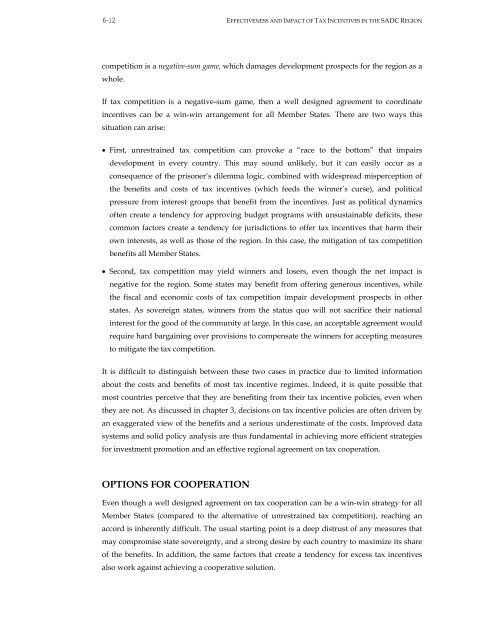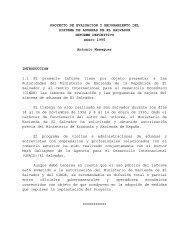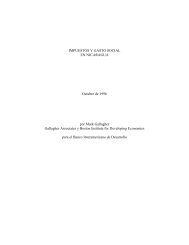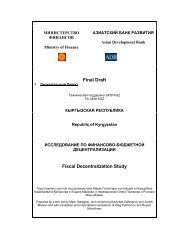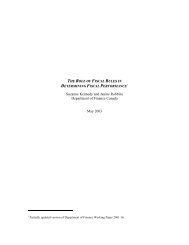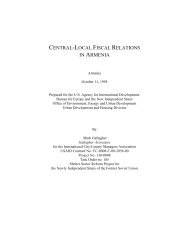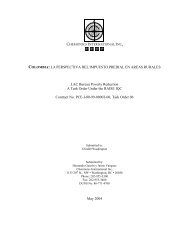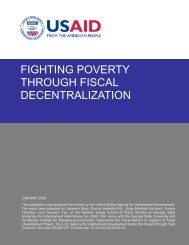Effectiveness and Economic Impact of Tax Incentives in the SADC ...
Effectiveness and Economic Impact of Tax Incentives in the SADC ...
Effectiveness and Economic Impact of Tax Incentives in the SADC ...
You also want an ePaper? Increase the reach of your titles
YUMPU automatically turns print PDFs into web optimized ePapers that Google loves.
6-12 EFFECTIVENESS AND IMPACT OF TAX INCENTIVES IN THE <strong>SADC</strong> REGION<br />
competition is a negative-sum game, which damages development prospects for <strong>the</strong> region as a<br />
whole.<br />
If tax competition is a negative-sum game, <strong>the</strong>n a well designed agreement to coord<strong>in</strong>ate<br />
<strong>in</strong>centives can be a w<strong>in</strong>-w<strong>in</strong> arrangement for all Member States. There are two ways this<br />
situation can arise:<br />
•<br />
First, unrestra<strong>in</strong>ed tax competition can provoke a “race to <strong>the</strong> bottom” that impairs<br />
development <strong>in</strong> every country. This may sound unlikely, but it can easily occur as a<br />
consequence <strong>of</strong> <strong>the</strong> prisoner’s dilemma logic, comb<strong>in</strong>ed with widespread misperception <strong>of</strong><br />
<strong>the</strong> benefits <strong>and</strong> costs <strong>of</strong> tax <strong>in</strong>centives (which feeds <strong>the</strong> w<strong>in</strong>ner’s curse), <strong>and</strong> political<br />
pressure from <strong>in</strong>terest groups that benefit from <strong>the</strong> <strong>in</strong>centives. Just as political dynamics<br />
<strong>of</strong>ten create a tendency for approv<strong>in</strong>g budget programs with unsusta<strong>in</strong>able deficits, <strong>the</strong>se<br />
common factors create a tendency for jurisdictions to <strong>of</strong>fer tax <strong>in</strong>centives that harm <strong>the</strong>ir<br />
own <strong>in</strong>terests, as well as those <strong>of</strong> <strong>the</strong> region. In this case, <strong>the</strong> mitigation <strong>of</strong> tax competition<br />
benefits all Member States.<br />
• Second, tax competition may yield w<strong>in</strong>ners <strong>and</strong> losers, even though <strong>the</strong> net impact is<br />
negative for <strong>the</strong> region. Some states may benefit from <strong>of</strong>fer<strong>in</strong>g generous <strong>in</strong>centives, while<br />
<strong>the</strong> fiscal <strong>and</strong> economic costs <strong>of</strong> tax competition impair development prospects <strong>in</strong> o<strong>the</strong>r<br />
states. As sovereign states, w<strong>in</strong>ners from <strong>the</strong> status quo will not sacrifice <strong>the</strong>ir national<br />
<strong>in</strong>terest for <strong>the</strong> good <strong>of</strong> <strong>the</strong> community at large. In this case, an acceptable agreement would<br />
require hard barga<strong>in</strong><strong>in</strong>g over provisions to compensate <strong>the</strong> w<strong>in</strong>ners for accept<strong>in</strong>g measures<br />
to mitigate <strong>the</strong> tax competition.<br />
It is difficult to dist<strong>in</strong>guish between <strong>the</strong>se two cases <strong>in</strong> practice due to limited <strong>in</strong>formation<br />
about <strong>the</strong> costs <strong>and</strong> benefits <strong>of</strong> most tax <strong>in</strong>centive regimes. Indeed, it is quite possible that<br />
most countries perceive that <strong>the</strong>y are benefit<strong>in</strong>g from <strong>the</strong>ir tax <strong>in</strong>centive policies, even when<br />
<strong>the</strong>y are not. As discussed <strong>in</strong> chapter 3, decisions on tax <strong>in</strong>centive policies are <strong>of</strong>ten driven by<br />
an exaggerated view <strong>of</strong> <strong>the</strong> benefits <strong>and</strong> a serious underestimate <strong>of</strong> <strong>the</strong> costs. Improved data<br />
systems <strong>and</strong> solid policy analysis are thus fundamental <strong>in</strong> achiev<strong>in</strong>g more efficient strategies<br />
for <strong>in</strong>vestment promotion <strong>and</strong> an effective regional agreement on tax cooperation.<br />
OPTIONS FOR COOPERATION<br />
Even though a well designed agreement on tax cooperation can be a w<strong>in</strong>-w<strong>in</strong> strategy for all<br />
Member States (compared to <strong>the</strong> alternative <strong>of</strong> unrestra<strong>in</strong>ed tax competition), reach<strong>in</strong>g an<br />
accord is <strong>in</strong>herently difficult. The usual start<strong>in</strong>g po<strong>in</strong>t is a deep distrust <strong>of</strong> any measures that<br />
may compromise state sovereignty, <strong>and</strong> a strong desire by each country to maximize its share<br />
<strong>of</strong> <strong>the</strong> benefits. In addition, <strong>the</strong> same factors that create a tendency for excess tax <strong>in</strong>centives<br />
also work aga<strong>in</strong>st achiev<strong>in</strong>g a cooperative solution.


